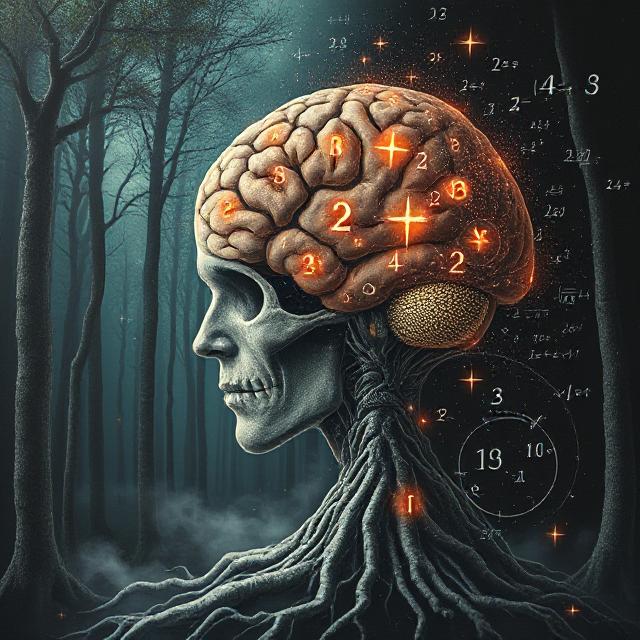
Table of Contents
Do Numbers Exist Outside the Mind?
Mathematics is often called the language of the universe. But a profound question has puzzled philosophers for centuries: Do numbers exist independently of the human mind, or are they merely mental constructs?
When you think of the number 7, do you conjure an abstract entity that exists in a realm beyond space and time? Or is 7 just a symbol or concept invented by humans to make sense of quantity?
This article explores the core philosophical positions on the existence of numbers, their implications, and why this debate matters beyond pure mathematics.
I. The Nature of Numbers: More Than Symbols?
At first glance, numbers appear straightforward — simple tools for counting and measuring. But deeper reflection reveals profound mysteries:
- Abstract Entities: Numbers are not physical objects. You cannot touch or see the number 5 itself, only five apples or five stars.
- Universal Truths: Mathematical statements like “2 + 2 = 4” seem necessarily true, regardless of culture or time.
- Objective or Subjective? Are these truths discoveries or inventions?
These questions frame the philosophical investigation into the ontology of numbers—their mode of existence.
II. Mathematical Platonism: Numbers as Abstract, Mind-Independent Entities
Mathematical Platonism, inspired by Plato’s theory of forms, holds that numbers and mathematical objects:
- Exist in an abstract, timeless, non-physical realm.
- Are discovered, not invented, by humans.
- Have objective properties independent of perception.
According to Platonists, when mathematicians prove theorems, they uncover eternal truths about these abstract entities.
Arguments for Platonism:
- Indispensability Argument: Mathematics is indispensable for science. Since scientific theories refer to real entities, mathematical objects must be real as well.
- Objectivity of Mathematics: Mathematical truths are universal and necessary, suggesting they exist beyond human thought.
- Explanatory Power: Platonism explains the uncanny effectiveness of mathematics in describing the natural world.
III. Nominalism: Denying the Independent Existence of Numbers
Nominalism rejects the existence of abstract mathematical objects. Instead, it views numbers as:
- Human-made symbols or linguistic constructs.
- Useful fictions or tools for organizing experience.
- Lacking any independent ontological status.
There are different varieties of nominalism:
- Conceptualism: Numbers exist only as mental concepts.
- Fictionalism: Mathematical statements are like fictional stories—useful but not literally true.
- Structuralism: Mathematics is about the relationships between objects, not about objects themselves.
Arguments for Nominalism:
- Abstract entities are mysterious and raise metaphysical problems.
- No empirical evidence exists for the independent existence of numbers.
- Mathematics can be reformulated without commitment to abstract objects.
IV. Other Views: Intuitionism and Formalism
Besides Platonism and Nominalism, other philosophies offer alternative views:
- Intuitionism: Mathematics arises from human intuition and constructive mental activity. Numbers exist only insofar as they can be constructed mentally.
- Formalism: Mathematics is manipulation of symbols according to formal rules, without inherent meaning.
These views emphasize human cognition and the language-like nature of mathematics, often rejecting metaphysical commitments.
V. Why Does It Matter?
The question “Do numbers exist outside the mind?” is more than abstract philosophy; it impacts:
- Foundations of Mathematics: What is the basis of mathematical truth?
- Philosophy of Science: How does math relate to physical reality?
- Epistemology: How can we know anything about abstract entities?
- Artificial Intelligence: Can machines understand or create mathematics?
Our stance on numbers shapes how we understand knowledge, reality, and even technology.
VI. Challenges in the Debate
- Epistemic Access: How do we access abstract numbers if they are non-physical?
- Ontological Parsimony: Should we accept a realm of abstract objects if we have no direct evidence?
- Applicability: Why should abstract numbers describe the physical world so well?
Both Platonists and nominalists grapple with these challenges.
VII. Conclusion: Numbers—Discovered or Invented?
The debate about whether numbers exist outside the mind remains open. Mathematical Platonism offers a robust framework for understanding the objectivity and universality of numbers, but faces metaphysical hurdles. Nominalism insists on parsimony and cognitive grounding but must explain the power of mathematics in science.
Ultimately, the question invites us to reconsider the nature of reality itself. Whether numbers are eternal truths waiting to be discovered or clever human inventions, they remain foundational to how we understand the cosmos.
